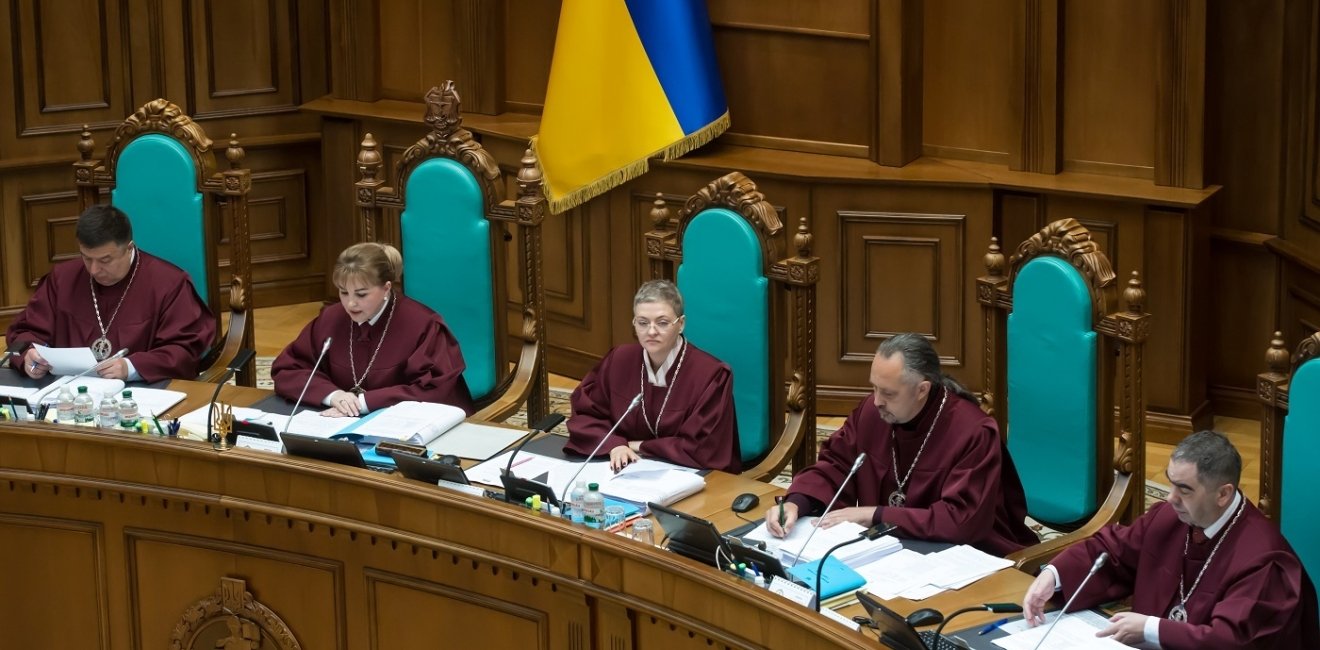The day Ukraine was invaded by the Russian Federation, President Zelensky issued a decree to declare martial law. The parliament approved the measure and martial law has remained in force since then.
The war and the adoption of martial law have created changes in the Ukraine’s constitutional process. For one thing, martial law has restricted some constitutional rights and freedoms. In addition, although Article 157 of the Constitution asserts that the Constitution may not be amended “in the conditions of martial law or a state of emergency,” the Constitutional Court has continued its work during the war, though on a limited basis. In particular, the granting of an EU candidate status to Ukraine has incentivized the administration to embark on a new set of reforms to meet the European Commission’s expectations, one of which is ensuring an independent judiciary. Also, the question of the legality of eliminating the immunity of members of parliament (MPs), which harks back to prewar days and entangled the court for almost three years, has been resolved.
Voiding MP Immunity
The voiding of MP immunity—a thorny issue almost since the start of Zelensky’s presidency—is one agenda item that through its sheer chronic nature has kept the constitutional process alive in Ukraine.
In 2019, when the new presidential team launched a wave of constitutional reforms in Ukraine, the newly elected pro-Zelensky parliament lifted some of the MP immunity provisions enshrined in Article 80 of the Constitution. This move, doing away with decades of privilege, did not go unopposed. In January 2020 a group of oppositional MPs asked the Constitutional Court to rule on the constitutionality of the process used to amend Article 80. On November 1, 2022, the court ruled that the process was indeed constitutional, ending a three-year-long internal dispute over the issue.
That was not the end of the affair, however. The Venice Commission—the Council of Europe’s constitutional law advisory body—mildly criticized the Ukrainian court’s decision, suggesting that it was inconsistent with previous interpretations of Ukraine’s Constitution and advising that inconsistency can “undermine legal certainty and constitutional stability” (p. 10). The Constitutional Court has yet to respond to this criticism.
EU Prospects Linked to Further Reforms of the Constitutional Court
Russia’s aggression and the West-led coalition in support of Ukraine have increased Ukraine’s chances of joining the EU, opening up new prospects for constitutional reform. On June 23, 2022, the European Council granted Ukraine candidate status and invited the European Commission (EC) to monitor the implementation of reforms required for Ukraine to meet the necessary conditions for the membership application to proceed.
One of the seven major issues that the EC identified as critical for Ukraine to access the EU is further reform of the Constitutional Court. The commission stated that the court needed to introduce “a credible and transparent selection procedure for appointments of judges” to the court, “including an integrity check” (p. 5).
Indeed, as the Ukrainian political system adapted to wartime conditions, the debates around reforming the Constitutional Court, inspired by EU membership prospect, came back to life. As a result, after much discussion by Ukrainian politicians and legal experts, as well as Venice Commission members, the government updated the mechanism of selecting the court’s judges. But this law created tensions between the Ukrainian government, on the one hand, and the EC and the Venice Commission on the other.
The law, which the Verkhovna Rada adopted on December 13 and President Zelensky signed on December 20, 2022, stipulates that the appointment of candidates to the Constitutional Court is to be executed with the participation of an Advisory Group consisting of six members, three of whom are to be appointed by the president, the Verkhovna Rada, and the Congress of Judges (one each). Three other members are to be chosen by the National Academy of Legal Sciences, the congress of representatives of law schools and research institutions, and representatives of public associations active in the field of constitutional reform, the rule of law, and human rights protection over the past five years. However, during first six years these last three members will come from the ranks of international legal experts.
In November 2022, the Venice Commission issued an urgent opinion in support of this version of the act and its final opinion before the Verkhovna Rada took a final vote on the law in December 2022. This time the Venice Commission was dissatisfied with the selection procedure described in the draft law and made two new recommendations. The first recommendation was that the Advisory Group add a seventh member, appointed by the international legal community, to reduce political influence on judge selection (points 60 and 72-78). The second recommendation was that parliament add to the law a provision that those candidates whom the Advisory Group rejected could not be accepted as candidates for a Constitutional Court judgeship (points 60 and 72-76).
The Verkhovna Rada approved the law without following these recommendations, prompting Ana Pisonero, the EC spokesperson, to issue a statement on December 23 expressing the hope that the Ukrainian authorities would fully take into account the Venice Commission’s recommendations in formulating its Constitutional Court law. This hope was not realized in 2022, and the tensions that emerged between Kyiv and Brussels remain on the agenda to be resolved for 2023.
The Constitutional Court’s Wartime Functioning
In 2022 the Constitutional Court continued to function, though with less and less efficiency. If in 2020–2021 the court’s subpar functioning was connected to conflict with the president and his administration, in 2022 the court had to work under the constant threat of Russian attacks, in the absence of a chairperson and with a minimal number of judges. The institutional conflict between the court and the presidency, however, died down.
Oleksandr Tupytsky’s term as chairperson and a member of the court expired in May 2022; moreover, he had left Ukraine at the start of the war. Several more judges resigned during the year, leaving the court with only thirteen out of eighteen members. With its ranks reduced and in the political environment created by the state of war, the court became much more open to cooperating with the presidential team. But the number of judges now barely suffices to carry out normal court duties and elect the court’s chairperson. For most of the year, the acting chairperson of the court was Judge Serhiy Holovaty. Even though the conflict between the presidency and the Constitutional Court has finally petered out, the Court can provide only limited constitutional oversight.
Perspectives and the To-Do List, War or No War
After the end of the war, Ukraine will face several pressing tasks, including repatriating millions of refugees and IDPs and reconstructing its economy. No less important will be reconstructing its political, constitutional, and legal systems in response to postwar issues. As President Zelensky pointed out in his address to parliament in December 2022, the postwar reconstruction will encompass all sectors and will be done with an eye toward accessing the EU. Also in December Oleksandr Kornienko, parliamentary vice-chairperson and the president’s close ally, told a gathering of civil society organizations that the presidential team envisaged significant constitutional reform after the war.
Despite the uncertainty of the war and the lack of clarity on how and when it might end, it is now more clear what steps the government needs to take in 2023. The EU membership prospect requires that Ukraine make the Constitutional Court a stronger and more independent institution. Ukraine is expected to appoint all court judges—a process that will test the new selection procedure. It is also expected to follow the Venice Commission’s recommendations to amend the law on the selection of judges and that the new selection process will enhance the court’s ability to guarantee proper constitutional oversight.
The opinions expressed in this article are those solely of the author and do not reflect the views of the Kennan Institute.









